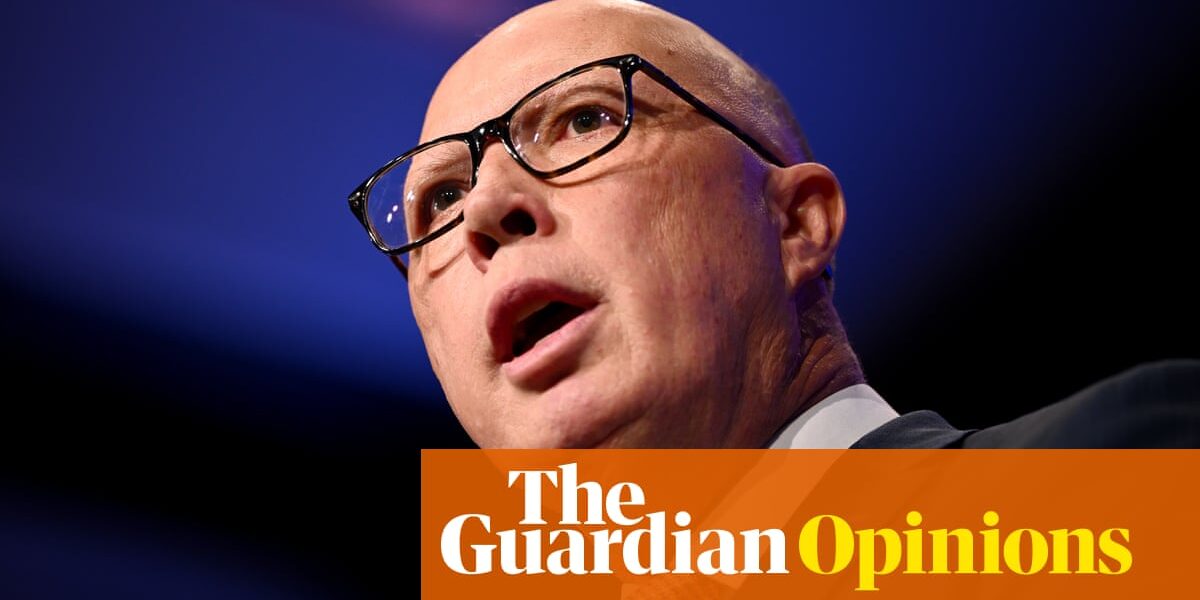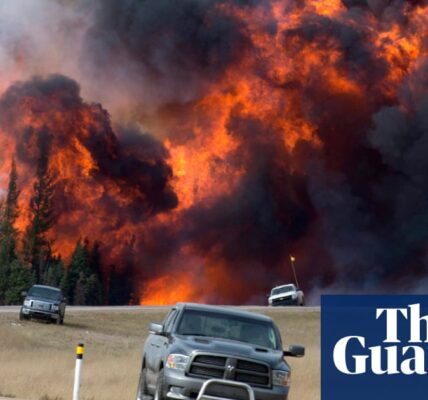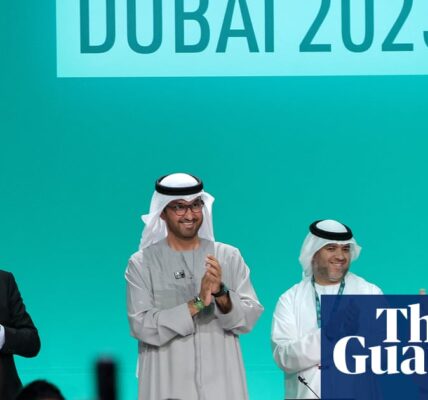‘Paris’ is burning consensus on Australia’s climate policies – and that’s how Peter Dutton wants it | Karen Middleton

When politicians talk about staying in Paris, some people think of climate change and the international pact to save the planet from a diabolical temperature rise. Many, though, likely imagine the Eiffel Tower or the upcoming Olympics, expensive hotels, fancy food or fashion – maybe even pollies’ snouts in the trough.
When Peter Dutton mentions Paris, he’s speaking to both groups but mostly the second, those not focused on what the Paris agreement is or why it matters.
Most people have better things to do than note where global climate summits were held and what was agreed there, and the opposition leader is not minded to enlighten them. In fact, he does the opposite.
“It’s OK for Mr Albanese to want to feel popular and get all the back slaps from Justin Trudeau and Emmanuel Macron at the Paris conferences,” Dutton said in the climate context on Thursday. “The prime minister’s responsibility is actually to the Australian public.”
Paris conferences? Backslapping?
The Paris agreement emerged from a United Nations climate change conference in, yes, Paris, in 2015. There are not “Paris conferences” upcoming, nor anything to prompt Francophone bonhomie. But Dutton seems unworried about making this up. If people think references to “Paris” are about Albanese jetsetting, he’s fine with that.
This nonsense from the putative prime minister underscores a few things about his decision to abandon the 2030 emissions reduction target and not name another before the next election.
First, it’s not really about climate change and only partly about energy. Mostly, it’s to amplify people’s fears and concerns during a period of high financial stress, and be seen to respond.
Ultimately, Dutton is sending messages to target voters so they’ll hear the bits he wants them to hear and disregard the rest, whether they live in climate-concerned teal seats, out on the suburban fringes or in the bush.
Dutton comes to this debate armed with Coalition research on what is worrying people, where they rate climate change, and how they feel about him and his opponent, Anthony Albanese.
From this he’s woven a narrative, sometimes internally contradictory, designed to amplify and empathise with the various concerns, neutralise his and the Coalition’s perceived weaknesses and exploit those identified in his opponent. It’s quite a tricky set of KPIs.
His emphasis changes as he pitches at different groups, even in the same breath. We used to call it dog-whistling. Now, it’s just politics.
The research shows climate change doesn’t rate as highly among concerns as it did three years ago. It’s the cost of living and then daylight, pretty much wherever you live.
This isn’t news to teal MPs because it’s also true in the city seats that once were Liberal. Climate action remains an issue there but cost pressures are first. Even the well-heeled – and their kids – can overextend.
Elsewhere, there’s a sizeable group for whom climate issues take the form of anger and anxiety about the renewable energy transition. This extends beyond the regional towns reliant on coal and the rural areas where wind farms and new transmission lines have people worried for landscape and livelihood.
The angst has spread to the suburbs, where the focus is on family and what the future looks like at home, not in Paris or anywhere else. As is common in straightened times, this trumps perceived loftier concerns such as Australia’s international obligations to try to keep any rise in global temperatures to 1.5C.
Among this cohort, renewables have come to represent fear of the future, financial pressure, uncertainty and broken promises.
Some in this group resent what they fear will be ugly infrastructure and blackouts to satisfy inner-city elites. They also believed power prices would come down – Labor’s pre-election promise to reduce bills by $275 a year – but they haven’t.
Among the more climate-aware, Coalition researchers report that as long as Dutton and co don’t sound like climate deniers, they won’t be marked down as at the last election. Voters are apparently also less hostile about Coalition attitudes to women than they were under Scott Morrison. These findings have the Liberals thinking some teal seats might be winnable after all. Dutton’s repeated labelling of Kooyong’s independent MP, Monique Ryan, as “a green” is a hint about which.
Also in this mix is research on negative views of Albanese: weak and indecisive, not delivering what he promises and unwilling to be honest about the state of the economy. They reinforce these descriptions constantly, just as Labor refers to Dutton as “divisive” and a prime ministerial risk.
Separately, there are signs the climate conscious are losing confidence in progress under the Albanese government.
Research commissioned by clean-energy investors suggests Australians increasingly don’t believe the target of net-zero emissions by 2050 can be met, and messages further inflaming that doubt are hitting home.
Here’s how the strategy is rolling out.
Dutton and the Coalition know they can’t abandon climate action altogether, and believe they can speak to the net-zero doubters by embracing “zero-emissions nuclear power” and arguing it could be installed before 2050. Handily, this also allows them to promise to keep using fossil fuels until the 11th hour.
But to do that, they need to abandon the legislated emissions reduction target for 2030 of a 43% cut on 2005 levels, because their approach means it can’t be met.
Helpfully, the Albanese government’s plan to achieve the target relies on 82% of energy coming from renewables by 2030, and that project is significantly behind schedule.
The government points to the Climate Change Authority’s on-paper assessment of its policies to argue the target will be met. But the authority isn’t so definitive.
“Achieving the 82% renewable energy target is going to be crucial for Australia’s ability to meet the 43% emissions reduction target,” its chief executive, Brad Archer, said in November. “This will require some heavy lifting … Renewables have been rolling out at a fast rate, but we have to go even faster, all around Australia, to hit the 82% target.”
This helps the Coalition argue that Albanese is gilding the lily. The idea of rolling renewables out faster just sends the anxious into orbit. To give that a nudge, the opposition calls the government’s policy “renewables only”.
It’s easier to justify ditching the 2030 target if you can sow doubt about meeting it. Even better if doubt already exists. Dutton’s opening salvo in the new climate wars went precisely to this point: if the government’s 2030 target can’t be achieved, what’s the point?
That was step one. Next, he confirmed he wouldn’t set his own target until after the next election because progress to net zero didn’t need to be “linear”. That’s where he’s leaving room for fossil fuels and nuclear power.
He insists he is still committed to the Paris agreement (incidentally refusing to acknowledge that revising down the 2030 target would put Australia in breach, whereas falling short in trying to meet it would not). That message is for those who do care about “Paris”. He also continued with the nonsense aimed at the others.
“The Labor party can try and please people in Paris – my job is to take care of the Australian people,” Dutton said on Tuesday, adding that Australians faced higher costs “just so that Mr Albanese can rub shoulders with leaders in Paris”.
He calculates that those enlivened by this rubbish rhetoric aren’t for turning on climate issues anyway.
This week’s frolic sets up two key themes of Dutton’s election campaign: that there is a risk of the lights and power going off by relying on renewables, but he could make it different; and that people can depend on him to be straight about how he would do it. Never mind that “transparency” doesn’t include revealing a 2030 target before the next election.
In short, it’s “who do you trust?”. We are back in 2004.
So, will this work? Some traditional Coalition constituents are alarmed. Already unsure about the government’s ability to meet existing medium-range targets, big business is extremely concerned at the Coalition’s sudden allergy to setting any at all. Certainty, this ain’t.
And nuclear power is a hard sell too, both on safety and on cost. Detail of that comes in stage two.
All in all, it’s pretty high-risk. This week confirms that Dutton’s is a scorched-earth strategy, with un peu – just a dash – of je ne regrette rien.
Source: theguardian.com


